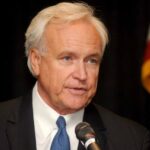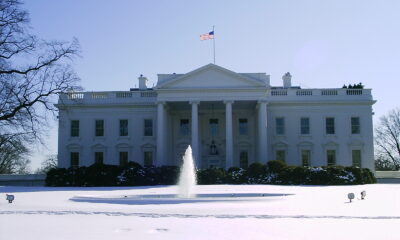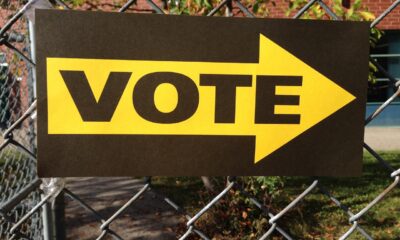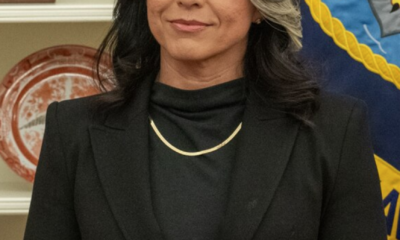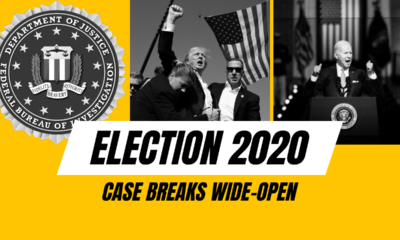Civilization
What Went Wrong With the Third-Party Movement This Cycle?

With No Labels abandoning its bid to run its “unity ticket” in 2024, the last hope for a moderate alternative to the duopoly of our incumbent parties for this election cycle vanished. This cycle began with great excitement in the middle of the political spectrum. The parties had careened so far toward the edges that it seemed a moderate alternative would finally emerge. In addition to the No Labels effort, Andrew Yang’s Forward Party merged with the SAM Party and the Renew America Movement to form a new party that could have been that moderate alternative.
The one successful third party – the Republican Party
But it was not to be. After spending millions on ballot access, No Labels was unable to find a credible candidate willing to run under its banner and the Forward Party has shrunk into irrelevance. With an election cycle that began with so much hope and enthusiasm for upsetting the duopoly, what went wrong? Fundamentally, these movements ignored history.
We have only had one successful third party in our country’s history. That was the founding of today’s Republican Party in the 1850s. At that time, the Democrat and Whig parties were the dominant parties. However, as the country grappled with the issue of slavery, both shirked from addressing the most important issue of that generation. So, a group of principled Americans decided to band together in a new political party that would take the issue head-on.
After the passage of the Kansas-Nebraska Act in 1854 that opened those two states to slavery, many in the Whig and Free Soil parties broke with their tribes and began to form state Republican parties, mostly across the Mid-West. More support quickly followed in New England and among Christian denominations opposed to slavery – Methodist and Quakers, in particular.
First use of the name Republican
The first convention was held in September of that year in Illinois, where the name “Republican” was officially adopted. That year the Republican party won the governorship of Michigan, and a number of incumbents in Congress joined the party. There were seven senators who identified as Republicans in the 34th Congress, and about 30 Republicans participated in a unified opposition caucus in the House.
Interestingly, Lincoln was not involved in the early days of the party, opting instead to attempt to revive the collapsing Whig party. His early misguided efforts remind me of some of my moderate Republican friends, who believe the Reagan-Bush golden years will return someday.
The Republican party held its first national convention in Philadelphia in 1856 and nominated John Fremont as its presidential candidate. By then, Lincoln had joined the party and campaigned for the vice president slot but was unsuccessful. Fremont went on to lose that election in a three-way race to James Buchanan. But in that election, Republicans won 20 Senate and 92 House seats. That was not a majority of either house, but in the 1858 election the party gained more seats, winning an outright majority in the House.
At the 1860 convention, it was not at all clear that Lincoln would be the nominee. On the first ballot he came in a distant second to William Seward. It was only after the fourth ballot that the convention finally settled on Lincoln.
That successful third party had an issue and a down-ticket base
There are two important takeaways from this history for those longing for a moderate alternative.
First and foremost, the Republican Party was organized around a political philosophy and a galvanizing issue, not the personality of a particular candidate. Every significant third-party movement since has been organized around a presidential candidate: Teddy Roosevelt and the Bull Moose Party, George Wallace and the American Independent Party, Ross Perot and the Reform Party. Once the presidential election was over, the candidate moved on and the parties fell apart.
Today, polling consistently shows that about half the country refuses to identify with either of the incumbent political parties. Moreover, that half favors more moderate, common-sense solutions to every major issue the country faces. Having that moderate alternative is the galvanizing issue of our time.
Second, the Republican Party built itself from the ground up. It nominated candidates for state offices and for Congress before it had its first presidential nominee. By the time Lincoln ran for the presidency in 1860, there were over one hundred Republicans in Congress and hundreds of others in state and local offices to support his campaign.
Neither feature present today
Both of these elements have been missing in subsequent third-party attempts and were in the failed attempts this year. The Forward Party leaders based their strategy on the bizarre belief that the party could not stand for anything other than electoral reform and some vague “can’t we all just get along” platform. No Labels, at least, made a half-hearted attempt at stating some principles. But those were so general that they were mostly received with a deafening yawn.
The crucial error in the No Labels strategy was that it dedicated its efforts solely to the objective of electing a presidential ticket, not building a true political party that would compete at all levels. Without that party infrastructure, running a national campaign for president is virtually impossible. It was, therefore, unsurprising that No Labels was unable to find a credible candidate.
Also, No Labels has never accepted that the two-party system is fundamentally flawed and must be replaced with a multi-party system. Its leaders believe that through some mechanism we can reset the two-party system and return to the halcyon days of bi-partisan cooperation. They miss that the primary system, the balkanization of the media, and gerrymandering have changed the political landscape forever. There is no going back to the Ronald Reagan-Tip O’Neill era.
Must build from the ground up
If moderates want to have a voice in the governance of their country, they are going to have to build a functioning political party from the ground up and articulate a theory of governance that resonates with, at least, a substantial plurality of the American people. The polling certainly indicates a longing for that alternative by about half the American people. I truly believe this is a situation that if we build it, they will come.
This article was originally published by RealClearPolitics and made available via RealClearWire.
Bill King is a businessman and lawyer, and is a former opinion columnist and editorial board member at the Houston Chronicle. He has served in a number of appointed and elected positions, including mayor of his hometown. He writes on a wide range of public policy and political issues. Bill is the author of “Unapologetically Moderate” and currently serves as the co-chair of the Forward Party of Texas.
-

 Accountability2 days ago
Accountability2 days agoWaste of the Day: Principal Bought Lobster with School Funds
-

 Constitution2 days ago
Constitution2 days agoTrump, Canada, and the Constitutional Problem Beneath the Bridge
-

 Executive19 hours ago
Executive19 hours agoHow Relaxed COVID-Era Rules Fueled Minnesota’s Biggest Scam
-

 Civilization18 hours ago
Civilization18 hours agoThe End of Purple States and Competitive Districts
-

 Civilization4 days ago
Civilization4 days agoThe devil is in the details
-

 Executive4 days ago
Executive4 days agoTwo New Books Bash Covid Failures
-

 Civilization3 days ago
Civilization3 days agoThe Conundrum of President Donald J. Trump
-

 Executive4 days ago
Executive4 days agoThe Israeli Lesson Democrats Ignore at Their Peril


